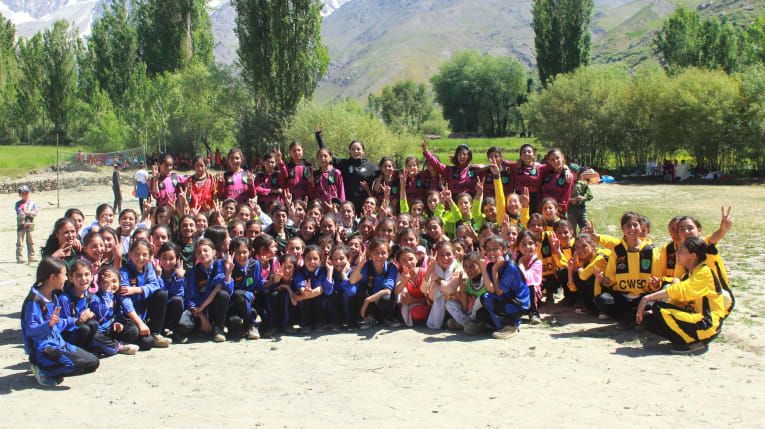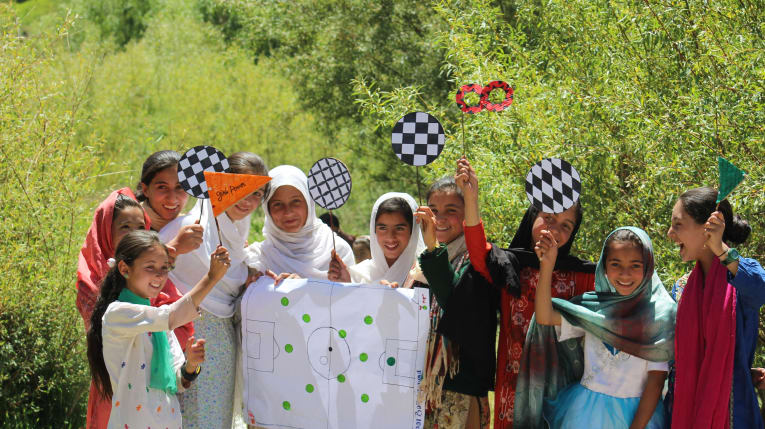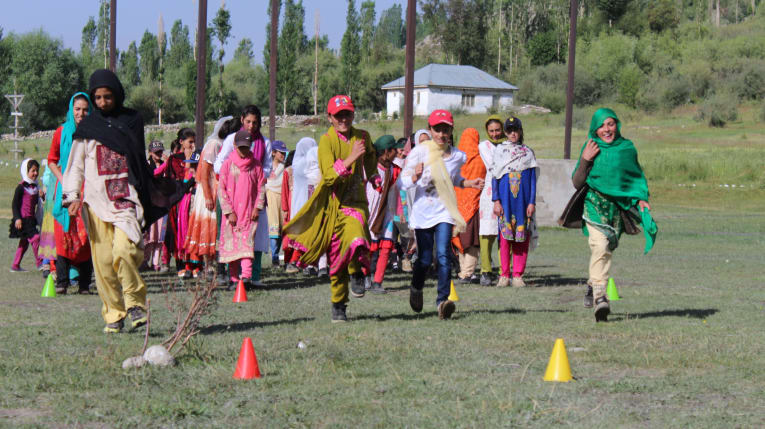In the latest edition of the AFC’s GameChangers series – which tells inspiring stories from women’s football in Asia – we meet the 23-year-old whose passion has taken her from northern Pakistan to Paris and Milan; and for whom the game provides a window to so much more.
For football fans around the world, the mention of the 2006 FIFA World Cup in Germany might conjure up memories of Zinedine Zidane’s dramatic last hurrah on the international stage, or the frequent interventions of Italy’s Fabio Grosso, but one of the tournament’s lesser known legacies came far away from Berlin or Munich.
Among the hundreds of millions watching the action unfold on television was a nine-year-old girl, more than 5,000 kilometres away in Pakistan. The impact is still being felt 14 years on.
“It started off as a nine-year-old girl, sitting with her father watching the World Cup,” Karishma Ali, now 23, told the-AFC.com. “That’s when I fell in love with football. I was a sporty kid, but I never really had the opportunities or facilities around where I could play sports. I was at home watching the games, until I went to the city and that’s when I got to play and further develop my skills.
“My dad was sporty, and he wanted me to play. He loved football, and that is the reason why I started watching and fell in love with the game.”
World Cups have served as the starting point for many a footballing love affair, but while Ali has played the game on an international level, she has evolved into far more than a footballer.
She is, among other things, an entrepreneur, the founder of a unique sporting club, a community volunteer and a strong advocate for the women’s game in her country.
It is a journey which has taken Ali from a remote region of northern Pakistan to the pages of Forbes and Vogue and the catwalks of Milan, but Chitral remains at the heart of her mission.

“I was born here. It’s a very beautiful place with a lot of beautiful scenery. High mountains, clean water, fresh air,” she said.
“We share a border with Afghanistan. Because I was born here in Chitral, I feel there are lot of areas that need development, and ever since I was little, I always wanted to help my people.

“I believe in giving back to society. You should acknowledge your privileges and help the ones who are not as privileged.”
Those principles, coupled with her later exposure to football in the city of Islamabad, lit a fuse inside Ali, who defied the odds to represent the Pakistan team at the 2016 Jubilee Games in Dubai, then set about helping other girls in her community to reach similar heights by setting up a club of her own.
The creation of the Chitral Women’s Sports Club was an unprecedented step, and one which required immense bravery and resilience from a woman barely out of her teens.

“In 2016 I got selected for these international games as part of the football team of Pakistan. I was criticised, I was threatened,” she recalled.
“People tried to discourage me, but that’s when I realised that many women and girls really don’t have the opportunity, and that someone needed to stand up with these girls. I know they have the potential to do a lot of things, but also to be amazing athletes and amazing footballers.
“(I want) to really empower girls both mentally and physically. This is the first sports club for girls, and, because it was the first, I had to face a lot of problems. Bullying, threats and what not, but I knew that if I persisted, I’d see a good future, not just for myself, but for the girls.”
“What I hope to achieve is to create a more healthy environment, and a more healthy group of girls. I really hope to see more girls playing sport; professionally, internationally. I see their potential, and there are a few girls who have exceptional talent.
“These are girls aged from eight to 16, so they still have time to work hard, develop and then who knows? They could make it to the international stage.
“In 2016 I was told I was the only footballer (from Chitral), now it’s 2020 and we have 100 girls playing football at our sports club. That makes me really happy and proud.”
She has already had a profound impact on the game at a regional level, but Ali sees much bigger possibilities.
Cultural factors and a lack of history in women’s football are among the obstacles which must be navigated, and Ali believes a change of mindset is key to unlocking wider opportunities for girls and women in the region.
“Girls in Pakistan face different kinds of barriers. The culture is different in Pakistan,” she explained.
“When you go to the north, to the villages, it’s much more strict and more conservative, and in the cities everything is totally different. With me, I had to face a lot of barriers from starting to play football. Even in the cities, there are cultural restrictions for girls which keep them bound to their homes, let alone playing sports.”
“There are people who do actually want their kids to go out and play sport, but they’re scared of what other people might say, and that’s why they won’t let them. This is what I want to change – the mindset of people.
“Thankfully I’ve been able to do that and now a lot of people trust in me. They see that I’ve gone far because of sport, and because of football, so they have that confidence in me to let their daughters come to Chitral Women’s Sports Club.”
To say Ali has ‘gone far’ is something of an understatement.
From Pakistan to Paris, and Milan to Melbourne, but with Chitral never too far away, her exploits in the sporting world and beyond have taken her far and wide, culminating in her inclusion in Forbes Magazine’s 2019 ‘30 Under 30 Asia’ List alongside actors, musicians and superstar athletes such as Sam Kerr and Naomi Osaka.
One of the more striking plot points in the Karishma Ali story was her collaboration with Italian fashion designer Stella Jean – a protégé of Giorgio Armani – which was also borne out of a desire to help her community.
“My mother calls me the problem solver because, since I was little, I have always wanted to help people and solve their problems,” she explained.
“Women are a vulnerable part of the society and in order the financially empower the women of Chitral so that they could live their lives with dignity, I started the Chitral Women’s Handcraft Centre in January 2019. The Centre connects artisans from 10 different villages.
“In the second quarter of our production we were introduced to an Italian designer, Stella Jean, who is a dear friend now. Stella wanted Chitrali and Kalash embroidery on her dresses for the Milan Fashion Week in 2019. The artisans at our centre, without any knowledge or training, were able to produce export quality embroidery. Stella Jean invited me to the Milan Fashion Week for me to witness the work of my artisans at the fashion show.”
Images of Ali appearing on the catwalk in a sweater emblazoned with the word ‘CHITRAL’ at the conclusion of the show serve as a stirring encapsulation of what, and who, she stands for.
That was further underlined earlier this year, when she used social media to raise funds to help 300 families in remote Chitral villages suffering through the crippling economic impact of COVID-19.
“I realised that people in Chitral needed more help than anyone. Men in Chitral work as daily wage labourers and, because of the lockdown, most of them had lost their jobs and returned home,” said Ali, who was also able to provide a significant amount of medical supplies to two local hospitals.
But while football is clearly just one piece of an ever-expanding puzzle, the game and its growth remain at the forefront of Ali’s focus.
Attending a 2019 FIFA Women’s World Cup match between China PR and South Africa in France was an inspiring experience – “I had goose bumps from the time I entered the stadium to the time the match ended” – but also one which made her long for the day the largely inactive Pakistan women’s national team can do the same.
The U-16 and U-19 women’s national teams took a step forward by entering the qualifying rounds for their respective continental championships in 2019, and Ali believes the emergence of Aqsa Mushtaq – an English-raised footballer from the Pakistani diaspora who last month signed for Italian Women’s Serie A club Napoli – will inspire many, but she also warns that home-based players need more matches, more often if they are to follow in her footsteps.
“For the men’s teams, even at a local level, there are many tournaments organised, whereas for the women there are none,” she said.
“I believe if female footballers are provided with proper facilities and given the opportunities, they have the potential to win international tournaments.”
While in France, Ali was also inspired by a meeting with Nadia Nadim, the Afghanistan-born footballer who went on to reach highest levels of the international game as a member of the Danish women’s national team and clubs such as Manchester City and Paris Saint-Germain.
“I got the opportunity to share my story with her and I remember we both got really emotional,” Ali recalled.
“I remember telling Nadia that I wish to meet her in the Champions League someday and she smiled and said, ‘I hope for the same’. I love Nadia Nadim. She is an inspiration for many girls around the world.”
By the time her journey ends, Karishma Ali may also be cited as a motivation to many. She certainly doesn’t plan to slow down.
“I don’t want to wait for someone to make things happen,” she declared. “I want to be the one to make things happen and bring change.
“In Chitral I hope to create a more inclusive society, where girls have to no longer face barriers in trying to pursue a career of their own choice.”
Just like that little girl in 2006, the world is waiting to see what happens next.
Photos: Chitral Women’s Sports Club, Karishma Ali


![GameChangers: Karishma Ali – More than football [the-afc.com] GameChangers: Karishma Ali – More than football [the-afc.com]](https://footballpakistan.com/wp-content/uploads/2020/09/Karishma-Ali-1160x549.jpg)